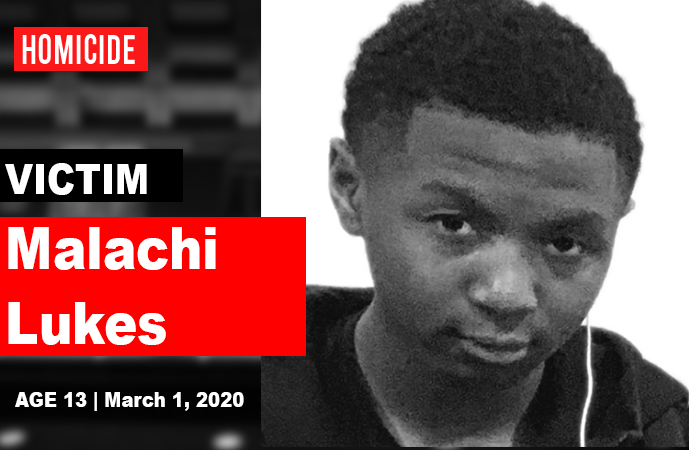
Thank you for reading D.C. Witness. Help us continue our mission into 2024.
Donate NowBy
McKenna Bryant
, Anthoine Godin - March 29, 2024
Daily Stories
|
Homicides
|
Juveniles
|
Shooting
|
Suspects
|
Victims
|
On March 28, DC Superior Court Judge Rainey Brandt heard testimony from a forensic analyst and a firearms expert about evidence related to a 2020 homicide case.
Koran Jackson, 23, Tyiion Kyree Freeman, 24, and Stephen Nelson, 33, are three of five individuals charged with multiple counts of conspiracy, assault with the intent to kill while armed, first-degree murder while armed, carrying a pistol without a license, and possession of a firearm during a crime of violence in connection to the fatal shooting of 13-year-old Malachi Lukes on March 1, 2020 on the 600 block of S Street, NW. The shooting also left a second juvenile victim located in the vicinity suffering from an apparent gunshot wound to the right leg.
The case also involves alleged co-conspirators Reginald Steele, 24, and Aaron Brown, 27.
Throughout the trial, the prosecution has attempted to connect Jackson, Freeman, and Nelson to additional shootings that occurred on Feb. 22, Feb. 24, and a second shooting on March 1, 2020. The prosecution alleges a firearm conspiracy by the defendants, in which they aimed to obtain and use specific weapons in Lukes’ homicide.
The prosecution called a Department of Forensic Sciences (DFS) crime scene scientist to authenticate items recovered during a March 29, 2020 search warrant at an address associated with defendant Steele.
The scientist stated that he catalogued a pair of multicolored Balenciaga running shoes, a Glock with an extended magazine, and two phones that investigators requested in their investigation.
In cross-examination, Freeman’s defense attorney, Shawn Sukumar, raised questions about the witness’ credibility based on a petition before the Supreme Court of Virginia about alleged discrepancies in evidence he presented in a blood spatter case
The scientist explained that the discrepancies were due to improper bookkeeping by different agencies and hasn’t affected his ability to testify since 2013.
Sukumar introduced body-worn camera footage of one of the officers from the search warrant pointing out a discrepancy between the time the officer arrived on the scene versus the time stamp on the footage.
Sukumar also asked the witness about a two-day suspension from DFS in May of 2023 for “lolly gagging”, to get overtime pay.
In adamant disagreement the witness replied, “I thought I was doing what was asked of me.”
In redirect, the prosecution pointed out that the alleged “mischaracterizations” by the witness were ruled unfounded by the court.
The prosecution also pointed out that despite his suspension, the witness still currently serves as a DFS supervisor.
Throughout the trial, the defense has wanted to cross-examine DFS witnesses about the lab’s loss of accreditation in 2021 official due to mishandling evidence and not fully acknowledging mistakes.
Judge Brandt said the defense is only allowed to mention DFS’ loss of accreditation as it relates to this specific case.
Continuing with scientific testimony, the prosecutor asked a firearms expert about his analysis of several guns allegedly used by the defendants between February and March of 2020. The witness said distinctive markings found on shell casings collected at the scene of Lukes’ homicide “were consistent” with a Smith and Wesson semi-automatic handgun that had been found in the possession of an unnamed associate of Freeman’s in August of 2020.
Additionally, the witness confirmed that four more bullet casings found at the scene of Lukes’ homicide were consistent with Polymer 80, semi-automatic handgun. The firearm had previously been introduced to the court as a “ghost gun” collected by DFS at a traffic stop on Rhode Island Avenue, NE, in March of 2020.
The witness also affirmed that one additional cartridge casing discovered at another shooting on Channing Street, NE, which occurred on March 1, 2020, was also consistent with the ghost gun.
That shooting happened right after Lukes’ murder and is alleged to have been committed by Freeman and Jackson.
The witness also identified seven additional cartridge casings from the shooting on Channing Street as consistent with a Glock 26 firearm with a laser sight. The court had previously heard testimony from a DFS technician who had recovered the firearm from a crime scene in April of 2020.
Additionally, the prosecution had introduced a photo allegedly of Nelson and Steele with guns equipped with laser sights.
In cross examination, Freeman’s defense attorney, Andrew Ain, said, “You can’t say what happens to items before you review them, correct?” asked Ain. The witness concurred. He also acknowledged that since the DFS lab has lost its accreditation, his company had gotten more prosecution business.
Under defense questioning, the witness confirmed he had been sent a Glock 26 which was labeled a Glock 32. The witness testified he saw the mix up as “a typo” when Ain asked if the error gave the witness “confidence that that evidence has been properly handled”.
In the prosecution’s redirect, the witness testified that the mislabeled evidence did not affect his testing of the firearms and that there were several characteristics he had used to connect certain cartridges to firearms.
Parties are slated to return April 1.
Follow this case